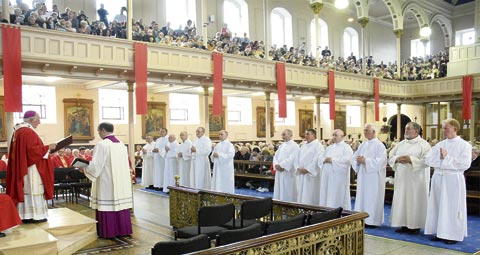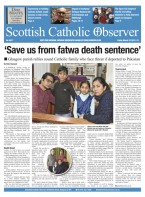June 3 | ![]() 0 COMMENTS
0 COMMENTS ![]() print
print

Deacons make a vital contribution
— ARCHBISHOP MARIO CONTI tells the SCO what motivated him to seek the reintroduction of the permanent diaconate in Scotland, and explains what his hopes are for its future
As a young priest, serving in Wick and Thurso in Caithness in 1962, Archbishop Mario Conti witnessed first-hand the strength of Faith among the good people in his congregation. What also became all too clear was the significant number of miles that separated many Catholics from their nearest parish and priest, and the clergy from one other.
Serving as he was, in an area where he did not have the benefit of ‘having the support of clergy round about him,’ he was inspired, therefore, when the Fathers of the Second Vatican Council paved the way for Catholic men to serve the Church as permanent deacons and immediately saw the benefits this ministry could hold for his own parish community.
“I was living through the council and was intrigued by how the Fathers were looking into opening up the Church at that time,” Archbishop Conti told the SCO. “I found myself, particularly in Thurso, among a primarily young and highly qualified congregation that had sprung up around Dounreay. It was then that I conceived how valuable it would be to seize this opportunity to recognise some of these people in a diaconate role. I was supportive of the idea.”
It was not until he became bishop of Aberdeen in 1977, however, that His Grace was able to put into action a plan to introduce a programme for the Permanent Diaconate, a vocation which allows both single and married men to be ordained and share in the ‘Apostolic authority’ of the Church. Aberdeen’s pilot formation programme would become the basis of training for the vocation in dioceses throughout the country.
History
The first deacons (servants) of the Church are recorded in the Bible in the Acts of the Apostles. Acts 6:1-6, introducing the account of the martyrdom of St Stephen, describes the first institution of the office of deacon as the Apostles recruited men to help them continue God’s work.
There are further references to the role of deacons. St Paul addresses ‘all the saints who are at Philippi, with the bishops and deacons’ (Philippians 1:1). And later (1 Timothy 3:8 sq) he impresses upon Timothy that deacons must ‘not double tongued, not given to much wine, not greedy of filthy lucre, holding the mystery of Faith in a pure conscience.’
The Second Vatican Council laid the foundations for the restoration of the Permanent Diaconate in the Church. Pope Paul VI implemented the recommendations of the council in the document, Sacrum Diaconatus Ordinem on June 18 1967 and, in some countries, the first new permanent deacons were ordained within a few years.
Such a move required the support of the Episcopal Conference in each country that wanted to have permanent deacons.
Upon the then Bishop Conti’s request—and for the benefit of Aberdeen Diocese—the Bishops’ Conference of Scotland subsequently sought the Holy See’s approval for the restoration of the Permanent Diaconate in September 1980.
“And for that I must pay tribute to my colleagues,” the archbishop said. “It allowed us to seek approval from the Holy See and, ultimately, set up a programme for the formation of permanent deacons.”
The petition was approved in May 1983. The first two men—John Futers and Jacques Cook—were accepted as candidates by Bishop Conti soon after and became his ‘proto deacons.’ They completed formation through distance learning in Lancaster Diocese and were ordained for Aberdeen in 1986. The silver jubilee of their ordinations is this year and the archbishop hopes they will play an active role in the coming celebrations.
Sharing the load
Archbishop Conti believes that deacons play a vital role in the Apostolic authority of the Church but is quick to dispel the myth that the permanent diaconate is in anyway a ‘mini priesthood.’
“The Church sees the tradition of the deacon as a role of charity within the Church,” the archbishop said, adding that they are ‘servants at the altar.’
“Some people mistakenly see the diaconate, priesthood and episcopate as if you are promoted from one to the other. In fact you should really start with the bishop.”
The archbishop referred back to early times and the Acts of the Apostles when there were ‘deacons’ and ‘elders’ the Apostles ‘conferred some of their authority on ordained men to fulfil different aspects of their apostolic ministry.’
“These roles should not be seen as a progression up the way, therefore, but as a sharing of some aspects of the Apostolic ministry by those who are chosen,” he added, including the tradition of having a deacon proclaim the Gospel.
In addition to administrative, Liturgical and Catechistic roles, deacons can also be called on to help in sacramental duties such as Baptism, and when brides and grooms bestow the Sacrament of Marriage on one another.
All deacons live in parishes but are not tied to a particular parish unless decided by their bishop.
Adopted by other dioceses
Archbishop Conti said that the training of permanent deacons in Aberdeen Diocese developed with the help of the priests in the diocese who were giving of their time and expertise in different areas. As the workload of the diocesan clergy increased their numbers decreased, however, a more permanent solution was required, which led to a formal training programme being introduced to continue and improve on training. This was introduced at Maryvale College in Birmingham.
Bishop Vincent Logan, the Scottish Bishop for vocations, followed then Bishop Conti’s lead by adopting the Permanent Diaconate programme in Dunkeld Diocese in 1991.
While Bishop Joseph Devine of Motherwell ordained Dr James Douglas, a former Church of Scotland minister, as a permanent deacon in 1986, Motherwell Diocese did not formally join the formation programme until 1994.
In 2001, the bishops of Paisley and Argyll and the Isles decided to restore the Permanent Diaconate in their dioceses.
In November 2003, St Andrews and Edinburgh Archdiocese announced its plans to restore the Permanent Diaconate and Galloway Diocese Galloway too joined the national programme in June 2005.
Glasgow Archdiocese
Upon his installation in Glasgow Archdiocese, Archbishop Conti saw a great opportunity to introduce the permanent diaconate there.
While in Aberdeen he saw the need for deacons to help the priests cover large geographical areas, in Glasgow he realised that priests often had more than one parish and congregation to attend to and he saw that that trend was likely to continue.
“Coming to an archdiocese which did not have the Permanent Diaconate programme, I had to start again,” he said.
On November 2002 Archbishop Conti indicated his intention to establish the vocation in the archdiocese, he installed Mgr Paul Murray as director of the programme in Glasgow and the opportunity was met with a great response. On Sunday June 28, 2009 the archbishop ordained 12 permanent deacons during a glorious ceremony at St Andrew’s Cathedral that the archbishop said was a ‘red letter day’ for the archdiocese.
“They are making a huge contribution,” he added.
There are currently 15 men in the first of four years of study and three are in the Year of Discernment.
Celibacy and family
While Archbishop Conti is delighted by the response so far to the programme for Permanent Deacons in Scotland, he told the SCO that it shares some of the same problems as vocations to the priesthood and religious orders and that promotion may be required in the future.
“There is a reluctance today among men to commit themselves to God,” he said on the wider subject of a falling number of vocations.
However, he said the suggestion that celibacy is the sole barrier to Catholic vocations does not ring true.
“Permanent deacons are not required to be celibate—the diaconate is open to men who are married, and the ministry requires great understanding and sacrifice on their families’ part—so there has to be something else at work today preventing lay Catholics from answering God’s call,” the archbishop said.
Nonetheless Archbishop Conti remains hopeful that the permanent diaconate will continue to attract interest and bring vocations to the Church.
– For further information go online and visit http://www. scotsdeacons .org.uk. Catholics interested in finding out more about the permanent diaconate should contact their parish priest or diocesan diaconate vocations director in the first instance.










